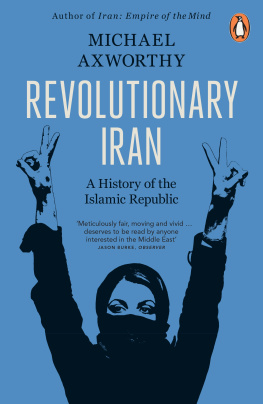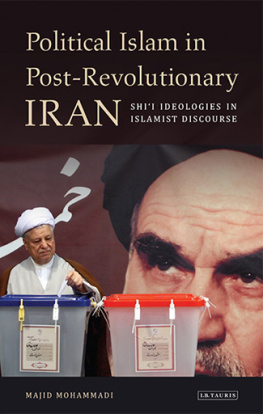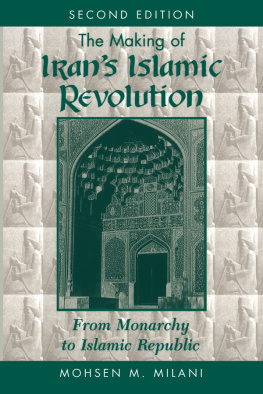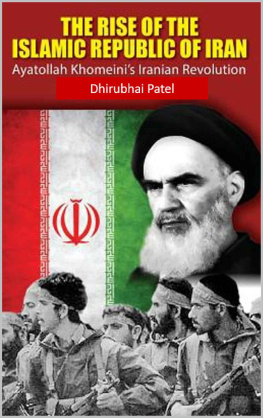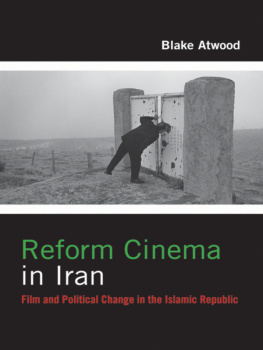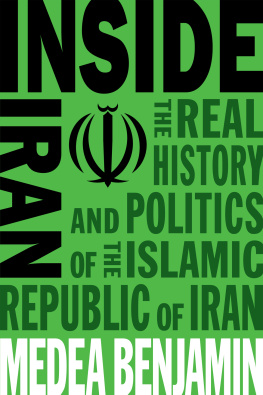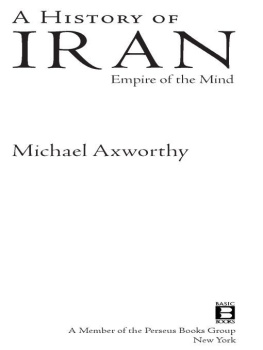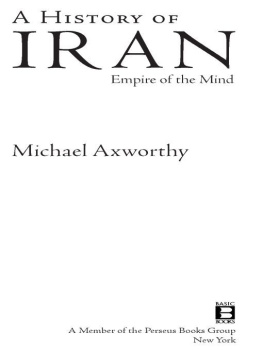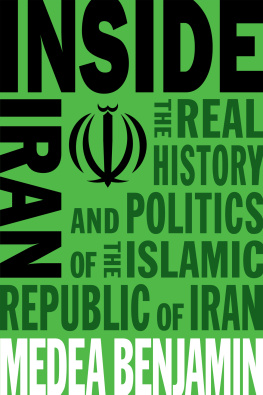Axworthy - Revolutionary Iran : A History of the Islamic Republic
Here you can read online Axworthy - Revolutionary Iran : A History of the Islamic Republic full text of the book (entire story) in english for free. Download pdf and epub, get meaning, cover and reviews about this ebook. year: 2019, publisher: Penguin Books Uk Ltd, genre: Politics. Description of the work, (preface) as well as reviews are available. Best literature library LitArk.com created for fans of good reading and offers a wide selection of genres:
Romance novel
Science fiction
Adventure
Detective
Science
History
Home and family
Prose
Art
Politics
Computer
Non-fiction
Religion
Business
Children
Humor
Choose a favorite category and find really read worthwhile books. Enjoy immersion in the world of imagination, feel the emotions of the characters or learn something new for yourself, make an fascinating discovery.
Revolutionary Iran : A History of the Islamic Republic: summary, description and annotation
We offer to read an annotation, description, summary or preface (depends on what the author of the book "Revolutionary Iran : A History of the Islamic Republic" wrote himself). If you haven't found the necessary information about the book — write in the comments, we will try to find it.
Axworthy: author's other books
Who wrote Revolutionary Iran : A History of the Islamic Republic? Find out the surname, the name of the author of the book and a list of all author's works by series.
Revolutionary Iran : A History of the Islamic Republic — read online for free the complete book (whole text) full work
Below is the text of the book, divided by pages. System saving the place of the last page read, allows you to conveniently read the book "Revolutionary Iran : A History of the Islamic Republic" online for free, without having to search again every time where you left off. Put a bookmark, and you can go to the page where you finished reading at any time.
Font size:
Interval:
Bookmark:



PENGUIN BOOKS
UK | USA | Canada | Ireland | Australia
India | New Zealand | South Africa
Penguin Books is part of the Penguin Random House group of companies whose addresses can be found at global.penguinrandomhouse.com.

First published in Great Britain by Allen Lane 2013
Published in Penguin Books with updated material 2014, 2019
Copyright Michael Axworthy, 2013, 2014, 2019
The moral right of the author has been asserted
The cover image is derived from a photograph taken during the demonstrations that followed the disputed election of June 2009 in Tehran. This woman has covered the lower part of her face not for religious reasons, but to avoid identification by the security forces. Hejab in Iran normally leaves the whole face open (Getty).
ISBN: 978-1-846-14292-5
This ebook is copyright material and must not be copied, reproduced, transferred, distributed, leased, licensed or publicly performed or used in any way except as specifically permitted in writing by the publishers, as allowed under the terms and conditions under which it was purchased or as strictly permitted by applicable copyright law. Any unauthorized distribution or use of this text may be a direct infringement of the authors and publishers rights and those responsible may be liable in law accordingly.
In memory of Isabelle Borg (19592010), Chris Rundle (19382012) and Daphne Caruana Galizia (19642017)
Question: You have been accused of cynicism, but a more recent suggestion is that you take the view that, in the face of the transcendence of God, no moral or political system has any authority.
Answer: I think one needs to put into that sentence No absolute authority, because I obviously dont believe it to be the case that no moral or political system can have authority. One has, I think, to be very mindful of the limits and ignorance of even legitimate government.
Maurice Cowling, answering a question from Naim Attalah in 1990
Reza Shah Pahlavi, 1930s
Mohammed Mossadeq, 1951
Mohammad Reza Shah, October 1967
A crowd listens to a speech by Ayatollah Taleqani, 1979.
Confrontation on the streets of Tehran, December 1978
Chaos at Mehrabad airport, 1979.
Shah raft Shah gone, January 1979.
Khomeinis return to Tehran, February 1979.
Khomeini waving to the crowd, 1979.
Khomeini being served tea at the Refah school by Sadegh Khalkhali, 1979.
Taleqani, Beheshti, Rafsanjani and Bani-Sadr in front of a toppled statue of the Shah, 1979.
Hostages at the American Embassy, Tehran, November 1979.
Knocked-out Iraqi tank near Susangerd, August 1981.
Iranian F-14 aircraft.
F-4 Phantom pilots photographed before the revolution, 1970s.
Iranian infantry frogmen, 1980s.
Mohammad Beheshti, 1980.
Bani-Sadr, 1980.
Ayatollah Montazeri, 1979.
Mohsen Rezai, 1987.
Burning tanker, Straits of Hormuz, 1987.
USS Vincennes, 1989.
Ali Khamenei, 2003.
Hashemi Rafsanjani, 1988.
Ali Larijani, 2007.
Mahmud Ahmadinejad, 2008.
Mohammad Reyshahri, 1997.
Mohammad Khatami, 1997.
Ayatollahs Mesbah Yazdi, Vaez Tabassi and Ahmad Jannati, 2001
Pegah Ahangarani voting, 2009.
Iranian woman in protest, Tehran, 2009.
Images copyright Bahman Sadeghi
Many people helped me to write this book. Prime among them were Baqer Moin and the late Chris Rundle, who both read the whole text and commented extensively. Chriss death in March 2012 was a shock and a great sadness to all who knew him he was a kind, modest and generous man, and a deeply knowledgeable, wise and sympathetic authority on all matters Iranian. I also profited by extensive comments and help from Mahnaz Zahirinejad, Ali Mossadegh and Siavush Ranjbar-Daemi; and (on specific points or more limited sections of the book) from Ali Ansari, Mahdi Dasht-Bozorgi, Sadegh Zibakalam, Luciano Zaccara, Farhad Taheri, Mark Gasiorowski, Esmail Khoie, Wayne White, Hamid Naficy, Walter Posch, Hashem Ahmadzadeh, Farhang Jahanpour, Dominic Brookshaw, Ahmad Salamatian, Shirin Ebadi, Christopher Andrew, Lord Owen and Haideh Sahim. For part of the period of writing I was living in New Delhi, where I benefited from the debates at the School of International Studies at Jawaharlal Nehru University; and through the kindness of Professors A. K. Pasha, Gulshan Dietl and P. R. Kumaraswamy, I was made a visiting scholar there. I also had the good fortune to meet Dr Yunus Jaffery, to benefit from his advice and several long conversations, and to visit the havelis of Old Delhi, and the roof of the Sunehri mosque. I am grateful to everyone at Penguin Books for their help towards publication especially Simon Winder, Marina Kemp, Richard Duguid, David Watson and Penelope Vogler, who for me have confirmed that Penguin is, as ever, the Rolls Royce of international publishing. I also have to thank my colleagues at the Institute of Arab and Islamic Studies at the University of Exeter for their help and support especially Gareth Stansfield, Rob Gleave, Sajjad Rizvi, Lenny Lewisohn and Tim Niblock; my students, for their liveliness and their patience; my children, for theirs; my agent, Georgina Capel, for her sound advice and unfailing cheerfulness; and as ever, my wife Sally.
In my books I have sought to transliterate Persian words in a way that will sound familiar rather than alien to Iranians, and I have tried (and occasionally failed) to be consistent. Beyond that, in my view, there is room for dispute, but little for any claim to absolute correctness.
In the summer of 2009 the world was watching Iran. Not because of the unresolved question of Irans nuclear programme, nor Irans troubled relationship with the United States, nor (at least not primarily) because of human rights abuses. The world and its media-wife were watching Iran because, thirty years after the Islamic revolution of 1979 (and a hundred years after the Constitutional revolution of 190611), Iranians were again on the streets of Tehran in hundreds of thousands, demanding free, democratic government and an end to tyranny. Iranians sometimes have an exaggerated sense of their countrys importance in the world. But for once it appeared justified. Would the Islamic republic fall? Or might it shift to a more open, freer version of itself that permitted elections to run their course in contrast to the manipulated process enforced by repression many believed they had suffered after 12 June 2009? If there is a spirit of movement and change in world events, which moves from place to place over time according to crises in human affairs, then that spirit was alive in Tehran in the summer of 2009.
As it turned out, repression seemed to succeed that time. The spirit moved on, after a pause, to other places in the region, to Tunisia, Egypt and Libya, where it was more successful; and to Bahrain and Syria. In Iran, repression has deepened. But the story is not yet over. Iran appeared central then and continues to be of central importance.
Next pageFont size:
Interval:
Bookmark:
Similar books «Revolutionary Iran : A History of the Islamic Republic»
Look at similar books to Revolutionary Iran : A History of the Islamic Republic. We have selected literature similar in name and meaning in the hope of providing readers with more options to find new, interesting, not yet read works.
Discussion, reviews of the book Revolutionary Iran : A History of the Islamic Republic and just readers' own opinions. Leave your comments, write what you think about the work, its meaning or the main characters. Specify what exactly you liked and what you didn't like, and why you think so.

